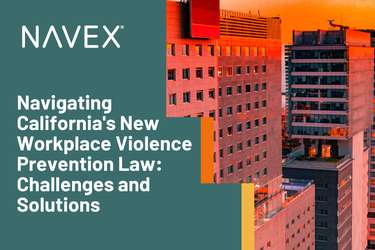This post was originally featured in July 2020.
When do your personal interests become conflicts of interest (COI)? Who should be screened for COIs? What about romantic or family relationships? This Q&A with two legal experts from a recent NAVEX Master Class answers some of the most common COI questions from a legal perspective. Rebecca Walker and Jeff Kaplan, partners from the Kaplan & Walker LLP law firm, shared the following insights following a popular Master Class, Master Class – Building a Robust & Sustainable COI Program.
Question: Does having a personal interest mean there is a conflict of interest?
Answer: The possibility of a personal gain can indicate a conflict of interest - but it doesn’t necessarily mean there is one.
A conflict is generally defined as having a personal interest that conflicts with the interests of one’s employer, the company. The existence of that personal interest creates the conflict. The conflict could lead to personal gain for the employee, to the detriment of the company, but it need not result in a gain for the conflict to exist.
In addition, the interest does not need to be personal to the employee in order to create a conflict. Interests of family members and others can also create conflicts of interest for an employee.
Question: Do romantic relationships at work create a conflict of interest?
Answer: Romantic relationships can create conflicts of interest.
Many policies require disclosures of and other controls governing romantic relationships in the workplace.
Romantic relationships are, of course, highly personal, and company requirements of disclosure can feel quite intrusive. However, romantic relationships can also impact judgment and – according to Freud and many people’s personal experience – are often more powerful than financial interests in their impact on judgment. Workplace romantic relationships can also have a corrosive effect on the culture of compliance at organizations.
The extent to which organizations can require disclosure regarding romantic relationships and create other controls in this area is governed by local law and collective bargaining agreements. However, many organizations do require disclosure of such relationships and also have policies prohibiting direct or indirect reporting relationships between employees in a romantic relationship. For additional information on romantic relationships and family members in the workplace, please see this article in ethikos.
Question: Is a conflict of interest the same thing as corruption?
Answer: Corruption and conflicts of interest do overlap, but they are not the same thing.
Corruption involves inducing a person to commit misconduct through some improper means. In the compliance world, corruption often refers to inducing a government official to commit misconduct through bribery.
For example, an employee can provide a corrupt payment to a government official to benefit her employer with no personal gain for herself, and therefore no personal interest – so no conflict of interest. This may involve a COI by the government official who accepts the corrupt payment for his own benefit and in violation of the fiduciary duties related to his position; but, although it is corrupt, it is not a conflict of interest for the employee, who has engaged in corrupt but not conflicted activity.
Question: Who should be monitored for conflicts of interest?
Answer: Senior executives and others should be screened for COI.
In addition to senior executives, anyone who is high risk should be monitored; for example, employees who work in procurement.
Question: Should employees be asked to declare interests of immediate family members?
Answer: It’s not unreasonable.
To some extent this is a function of applicable law, which may limit how far an organization can go in this regard. As a general matter, many companies do include the interests of immediate family members within the scope of conflicts of interest declarations (and policies more generally). Some policies also include an explanation of the scope.
Example COI Declaration for Family Members:
“To the extent permitted by local law, some components of this Policy also apply to members of your immediate family. While the Company wishes to limit intrusion into the personal lives of employees, conflicts standards must be written somewhat broadly in order to protect the Company’s interests. Otherwise, the Policy may not cover all of those interests that could impact your decision-making on behalf of the Company, and it would be easy to avoid the rules by asking family members to engage in conduct that is prohibited for you.”
Question: Should third-party vendors certify they have no conflict of interest?
Answer: As a general matter, a vendor should not be required to have no conflicts of interest with its customer, since there is no fiduciary relationship between the two organizations.
However, vendor conduct can create employee conflicts of interest. Agreements with vendors and vendor codes of conduct often address this type of conduct. For example, if vendors give gifts to customer employees, this can create conflicts of interest and bias in favor of that particular vendor. And if a vendor employee is related to an employee at your company who has oversight or influence with respect to the vendor, then that can create a conflict.
Learn about COI Disclosures: Track and analyze all your disclosures in one place
Question: Can conflicts of interest exist between companies or clients?
Answer: Yes, conflicts can exist between companies and between clients.
Organizations can have duties to their clients or customers, suppliers, the general public, as a gatekeeper, or to others, and when those duties conflict with each other or with the organization’s own interests, there can be conflicts.
Such conflicts are fairly common in the financial services industry and in the government contracting context. These types of conflicts should be identified and considered in the conflicts of interest risk assessment.
Question: If the general counsel is also the CCO, is a potential conflict of interest created?
Answer: Not necessarily.
There has long been debate about whether a potential conflict of interest results from a lawyer serving as both the general counsel and the chief compliance officer of an organization. Potential conflicts are said to result from combining these positions. In particular, that general counsels have the responsibility of defending an organization against claims of misconduct, while CCOs have the responsibility of preventing and remediating misconduct.
However, in our experience, it is possible to have an effective program with these roles combined. In fact, there can be significant benefits from having the compliance and law departments combined.
Learn more: Should CCOs report to general counsel?
Question: How can I increase business accountability for conflicts of interest?
“Our line managers are responsible for managing conflicts of interest of their employees. The compliance department is only involved if other managers aren't sure how to handle things. Is that OK?"
Answer: As a general matter, placing compliance responsibilities with line management can be a good thing, as long as there are clear policies around conflicts of interest – including escalation policies – as well as auditing to make sure policies are being followed.
Question: What conflicts of interest should HR consider when establishing a COI program?
Answer: In addition to gifts and entertainment, personal relationships, and outside business activities, other relationships and activities that could create conflicts of interest, include:
- Personal investments and financial interests
- Business opportunities
- Outside employment
- Business relationships with the company
- Family relationships at the company
- Romantic relationships at the company
- Family and romantic relationships involving other companies, where the employee has a family member or romantic partner who works for a supplier, customer or competitor
- Running for or serving in public office
- Accepting business courtesies
- Public service and charitable activities
- Serving as a director or on an advisory board
*Please note that this list is not comprehensive.
Watch Rebecca and Jeff’s on-demand Master Class – Building a Robust & Sustainable COI Program -- to learn more about conflicts of interest issues including corruption, personal gain, romantic work relationships and more.
This expert Q&A is thanks to our experts, Rebecca Walker and Jeff Kaplan, partners from the Kaplan & Walker law firm, for graciously sharing their expertise on conflicts of interest.
NAVEX is hosting an updated master class on conflicts of interest on September 8, 2022. For more information and to secure your spot:








